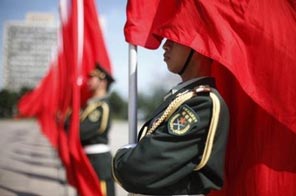China announces small rise in defence budget
BEIJING: China on Thursday announced its smallest defence budget increase in years amid national belt-tightening, and vowed that its rapid military modernisation posed no threat to other countries.
The proposed military budget for 2010 is 532.1 billion yuan (77.9 billion dollars), up 7.5 percent from actual defence spending in 2009, a government spokesman said.
The figure breaks a string of double-digit increases going back many years that has caused worry among China's neighbours and the United States over the objectives of an effort to rapidly modernise its once-backward armed forces.
"China is committed to peace," Li Zhaoxing, spokesman for the National People's Congress (NPC), said in unveiling a figure he called "reasonable."
"The sole purpose of China's military strength is to protect China's sovereignty and territorial integrity," he told a news conference.
"At least from a symbolic level the message is that in tough economic times, the military has to tighten its belt too," said Tai Ming Cheung, a researcher at the University of California Institute on Global Conflict and Cooperation.
Li said the figure was in a budget submitted to the NPC, China's rubber-stamp parliament, which opens its annual session on Friday and typically approves such items by overwhelming margins.
Li, a former foreign minister, said the bulk of the spending increase would go towards improving conditions for China's 2.3 million service personnel and for the "revolution" in China's military, a phrase referring to modernisation.
He added it would help China "face multi-faceted military threats (and) improve capabilities for diverse military tasks," without elaborating.
He however stressed the figure amounted to only about 1.4 percent of China's gross domestic product, compared to what he said was four percent for the United States and more than two percent for Britain, France and Russia.
It was not immediately clear when China had last announced such a low rate of increase due to the lack of transparency in official statistics.
However, it was the slowest in at least a decade, and less than half of the 15.9 percent average rate of increase from 1999-2008, according to figures reported last year by state media.
Last year's increase was announced at 14.9 percent.
However, the figure is widely viewed as under-representing actual spending, with some key military programmes kept off the official books.
Cheung said actual spending was probably two to three times the official budget.
A Beijing-based Western expert on Chinese defence issues who asked not to be named said the budget traditionally reflected the overall economy.
But he added that the figure "is certainly not as big as the military brass would have liked in order to pursue their modernisation efforts" and would probably cause various forces in the military to jockey for funds.
Cheung said the budget could also be a symbolic gesture to Taiwan.
"There has been an improvement in cross-strait relations and a reduction in security tensions so they may offer this as a token olive branch," he said.
China has claimed the self-ruled island since they split at the end of a civil war six decades ago and does not rule out using force to reclaim it.
But ties have warmed dramatically since the 2008 election of the more China-friendly Taiwan President Ma Ying-jeou.
Tensions have however emerged between China and the United States after Washington approved the sale of 6.4 billion dollars in weapons to Taipei.
In retaliation, China announced in January it was cutting off military contacts with the United States.
During the National Day celebrations last October, China unveiled the fruits of its modernisation push by parading a range of sophisticated home-grown weapons including missiles, fighter jets, high-tech radar and other support systems.






